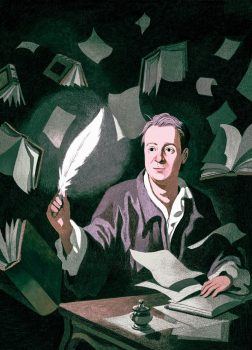Adam Gopnik at The New Yorker:
 Diderot is known to the casual reader chiefly as an editor of the Encyclopédie—it had no other name, for there was no other encyclopédie. Since the Encyclopédie was a massive compendium of knowledge of all kinds, organizing the entirety of human thought, Diderot persists vaguely in memory as a type of Enlightenment superman, the big bore with a big book. Yet in these two new works of biography he turns out to be not a severe rationalist, overseeing a totalitarianism of thought, but an inspired and lovable amateur, with an opinion on every subject and an appetite for every occasion.
Diderot is known to the casual reader chiefly as an editor of the Encyclopédie—it had no other name, for there was no other encyclopédie. Since the Encyclopédie was a massive compendium of knowledge of all kinds, organizing the entirety of human thought, Diderot persists vaguely in memory as a type of Enlightenment superman, the big bore with a big book. Yet in these two new works of biography he turns out to be not a severe rationalist, overseeing a totalitarianism of thought, but an inspired and lovable amateur, with an opinion on every subject and an appetite for every occasion.
He was and remains, as Zaretsky says simply, a mensch. He is also a very French mensch. He is a touchingly perfect representative—far more than the prickly Voltaire—of a certain French intellectual kind not entirely vanished: ambitious, ironic, obsessed with sex to a hair-raising degree (he wrote a whole novella devoted to the secret testimony of women’s genitalia), while gentle and loving in his many and varied amorous connections; possessed of a taste for sonorous moralizing abstraction on the page and an easy temporizing feel for worldly realism in life; and ferociously aggressive in literary assault while insanely thin-skinned in reaction, littering long stretches of skillful social equivocation with short bursts of astonishing courage.
